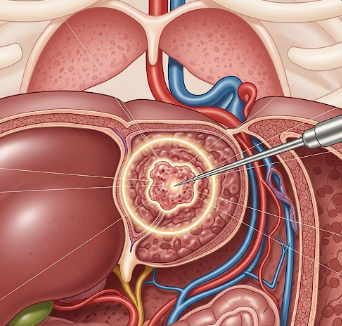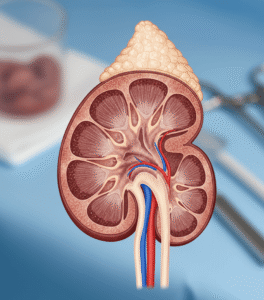Overview
Ablation is a medical procedure used to remove or destroy abnormal tissue, often to treat tumors, cardiac arrhythmias, or other localized pathological conditions. The procedure can target tissues in the heart, liver, kidneys, lungs, or other organs using various energy sources such as radiofrequency, laser, microwave, or cryotherapy.
In Korea, ablation procedures are performed in highly specialized hospitals with state-of-the-art imaging, precise targeting technologies, and minimally invasive techniques. Ablation offers patients a safe, effective alternative to traditional surgery with shorter recovery times and reduced complications.
What is Ablation?
Ablation refers to the destruction of abnormal tissue using controlled energy to prevent further disease progression.
Common types of ablation include:
- Radiofrequency Ablation (RFA): Uses heat generated by radio waves to destroy tissue
- Cryoablation: Uses extreme cold to freeze and kill abnormal tissue
- Microwave Ablation (MWA): Uses microwave energy to generate heat and destroy tissue
- Laser Ablation: Uses laser energy for precise tissue removal
Key points:
- Minimally invasive and often performed percutaneously or endoscopically
- Can treat tumors, cardiac arrhythmias, or abnormal vascular tissues
- Reduces the need for open surgery and long hospital stays
- Often guided by ultrasound, CT, MRI, or fluoroscopy
What are the benefits?
- ✅ Minimally invasive with small incisions or needles
- ✅ Shorter hospital stay and faster recovery compared to open surgery
- ✅ Can precisely target abnormal tissue without damaging healthy tissue
- ✅ Often performed under local anesthesia or conscious sedation
- ✅ In Korea, advanced imaging and expert operators maximize safety and efficacy
- ✅ Can be used as primary therapy or adjunctive treatment for cancers, arrhythmias, or vascular lesions
Procedure Details
1) How should I prepare for Ablation?
- ➤ Preoperative evaluation: Blood tests, imaging (CT, MRI, or ultrasound), ECG for cardiac procedures
- ➤ Discuss medications, allergies, and pre-existing conditions
- ➤ Fasting may be required for several hours before the procedure
- ➤ Pre-procedure counseling about risks, benefits, and post-op care
- ➤ Arrange for transport home, especially if sedation or anesthesia is used
2) What happens during the procedure Ablation?
- ✅ Procedure may be performed under local anesthesia, conscious sedation, or general anesthesia depending on the target site
- ✅ Imaging guidance used to precisely locate the abnormal tissue
- ✅ Ablation is performed using radiofrequency, microwave, cryotherapy, or laser
- ✅ Procedure duration depends on the organ and lesion size: usually 30 minutes to 2 hours
- ✅ Continuous monitoring of vital signs and target tissue response
- ✅ After completion, the access site is dressed, and small catheters or needles removed
3) What happens after Ablation?
- ➤ Patient monitored in recovery for a few hours to overnight, depending on the procedure
- ➤ Pain or mild discomfort managed with analgesics
- ➤ Most patients resume normal activity within days
- ➤ Follow-up imaging may be scheduled to confirm treatment success
- ➤ Instructions provided on wound care, activity restriction, and signs of complications
Risks / Benefits
Potential Risks:
- ➤ Bleeding or hematoma at the access site
- ➤ Infection at puncture or surgical site
- ➤ Damage to adjacent organs or structures
- ➤ Pain, swelling, or bruising
- ➤ Rare: arrhythmias (for cardiac ablation), nerve injury, or recurrence of treated tissue
Benefits:
- ✅ Effectively removes or destroys abnormal tissue
- ✅ Minimally invasive with smaller incisions and shorter recovery
- ✅ Can be repeated if necessary for tumor recurrence or arrhythmia
- ✅ Reduces risk associated with open surgery
- ✅ In Korea, precise imaging guidance ensures optimal outcomes
Recovery and Outlook
- Hospital stay: Usually same day or 1–2 days depending on the procedure site
- Activity: Gradual return to normal activities; avoid strenuous activity for a few days
- Follow-up: Imaging or ECG to assess success of ablation and monitor for recurrence
- Pain management: Mild discomfort is usually controlled with medications
- Outcome: Ablation offers high success rates for tumors, arrhythmias, and vascular lesions, with rapid recovery and minimal complications
When To Call the Doctor
- ➤ Persistent bleeding or swelling at the puncture site
- ➤ Fever or signs of infection
- ➤ Severe pain or unusual symptoms
- ➤ Shortness of breath or chest pain (for cardiac ablation)
- ➤ Signs of recurrence of the treated lesion
Best Korea Option / Process
- ✅ Korea offers state-of-the-art ablation centers for oncology, cardiology, and interventional radiology
- ✅ Procedures are performed by highly trained specialists using advanced imaging guidance
- ✅ Minimally invasive techniques reduce hospital stay, pain, and complications
- ✅ International patients benefit from VIP services, English-speaking staff, and coordinated care
- ✅ High precision ensures treatment success and faster recovery













